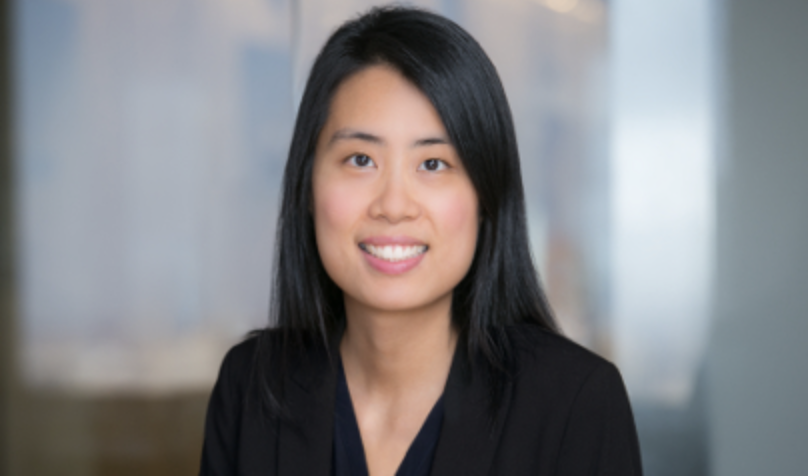In today’s New Voices, Joy Guo explores the beginning days of the national lockdown in “An Essential Service.” Accompanying her mother on her house-call nail service appointments, the narrator of “An Essential Service” experiences first hand all her mother does and deals with to support the family. Guo’s voice is sharp and earnest, with a critical eye turned toward the social strata that became more obvious during the heart of the pandemic.

It was still dark when we finished breakfast and Ma packed what we needed for the day—oily smock and slippers, two masks, my Hello Kitty suitcase with the bum wheel. Inside the suitcase were nail polish, remover, hand towels, clippers, cotton pads, a foot buffer with removable pads. “Come on,” she said, waving away the grey, queasy look on my face from being woken up abruptly. Ba would never have approved of Ma taking me with her on these trips, but as soon as I darted around his name, she said, “Go right ahead, tell him,” biting off the end of the sentence. Besides, what could Ba do, marooned in Beijing for the foreseeable future?
In the car, Ma told me to prep the polish for the day’s appointments. The selection was mostly moldy yellows and greens, only a handful of nudes and pinks, one coarse red, like the inside of a secret. It was all that Ma had time to grab before the salon closed. Most of the polishes had gone slack, separating into two distinct layers of pigment and oil. I thwacked each tube against my palm, the way Ma had done so many times. Still, the tiny, bottled horizons clung to the glass.
“Remember,” Ma said, more to herself than to me. “Let’s do this fast. In and out.”
I was old enough to understand a stay-at-home order and how we were disobeying it. When it was announced on the seven o’clock news, Ma scribbled down a bunch of names and numbers, made calls all evening, double-checked our Camry’s tires. By the next morning, she had a plan, one that carved out a role for me to play. “You can do your homework in the car,” she insisted. That was Ma’s way, ignoring details like my tendency towards motion sickness, in favor of hurtling towards the bigger picture, which was that we had to eat. Plus, as she explained, the odds were good a customer wouldn’t stiff her on a tip if I was with her, standing right there in front of them in my unbrushed hair and egg-stained overalls.
We did our usual loop through Rockland, Westchester, Putnam, Duchess. Something about Ma’s clenched jaw, her fingers drumming against the steering wheel, made me think of the other technicians. The aunties who spoke Malaysian or Fujianese, who called me Cindy’s girlie and fished out stale candies from their pockets. The last time I was at the salon, Ma was training two new girls, one from the Philippines, the other from Texas. Together, their English amounted to “Square or diamond?” and “Which free scrub you like?” Ma had them practice for hours on the plastic molds. The Texan’s hands shook badly, sending wild streaks of color against the unforgiving white. Watching her struggle, the others were quiet, but I knew what they were thinking.
“The aunties—” I fiddled with the Camry’s wheezing radiator.
“What about them?”
“How are they doing?” I pictured other station wagons, with other children stuffed in the back, plodding through the same towns, knocking on the same doors.
“They’re fine. Don’t worry about them. Worry about us.”
The first stop was always Mrs. Miller, who lived the furthest out and met us at the back porch with her mask askew. Leading us into her laundry room, she had set up a lounge chair and a child’s stool, which Ma took without a word. Mrs. Miller’s feet carried a yeasty funk. “I think I’ll go with the purple today,” she said, sighing as Ma dug her knuckles into the rough patches.
Ma had made it halfway through the left foot when Mrs. Miller started coughing, a wheeze rattling deep in the chest. We froze.
“Sorry,” she said. “Got a tickle back there.” Her mask hung below her nose.
I volunteered to go get some water.
As I filled up a glass from the faucet, I heard Mrs. Miller intone, “Such a sweetheart. So helpful.”
By the third house, Ma and I fell into our routine, whittling the time spent inside to twenty-five minutes, even twenty. I would run back and forth, fetching magazines, books, mugs of coffee. Or, squatting beside Ma, I would hand her the nail polish or one of the implements. It made me happy, this feeling of being useful, of being close to her and occupying the same space, above which the customer sat.
On the way to our next appointment, Ma turned into the parking lot of a supermarket. “Hey,” she said, “Let’s not tell Ba about this, okay?” This being scavenging food samples, which, cobbled together over multiple trips and double-backs and detours, made up a meal. Each time, we competed to see who could disguise herself the best, trick the worker, amass the most paper cups. With Ba around, we had to restrain ourselves. He refused to play along, to take any of the food. He was embarrassed, I saw, at how eagerly Ma put her hand out, how she cut others who were waiting for the food to cook, how she took seconds and thirds, how I learned from her to do the same.
Today, however, the supermarket was devoid of any sample station.
“Where did it go?” Ma asked an employee.
“We got rid of it. For now. It’s not safe.”
Both of us had lapsed into a resigned silence as we pulled into the driveway of the last house. A girl, around my age, sporting a mask freckled with tiny bows, opened the door.
“Oh, thank God,” Mrs. Hudson said when she saw me and Ma standing there. “Thank God. My feet are an absolute fright. Charlie, you remember the nail lady, right? And her daughter too. What’s your name?”
I opened my mouth, but Mrs. Hudson had already turned away.
As Ma worked in the other room, Charlie trundled away with the suitcase. “Wait,” I said. Charlie bent down, unzipped the side, and dumped the contents onto the floor. Tubes rolled every which way. A halt in Mrs. Hudson’s phone conversation the next room over, and then it resumed. Charlie promised to put everything back but first, she wanted to look at the bottom of each bottle, where a small white sticker declared the name of the color.
“What’s this one say?”
“Bor-dough.”
“What’s this one? And this one?”
“Stop it,” I snapped, trying to cram everything back into the suitcase. The zipper’s teeth caught. I kicked at the seam in frustration.
“Hey. Can you do my nails too?”
I gaped at her, the too ballooning between us. She cocked one foot out.
It wasn’t hard, painting someone’s toenails, that was what I had learned from watching Ma. You started at a corner of the nailbed and worked your way outwards with short, quick, exacting strokes. Like layering on feathers. The key was to be patient. Steady. Slow. It was okay if you smudged. Just use the edge of your nail to scrape it away. One coat, two coats, done. And then you knelt, bent down to the floor, and blew, over and over, to make sure the polish hardened into a shell.
Sitting back on my haunches, I corked the bottle. Charlie’s nails gleamed pinkly.
“Do you like it?” A soreness had seeped into my shoulders and neck, from resting my elbows against the wooden floor, but my heart rabbited with pride at the neat lines, the absence of any smudges. I hadn’t needed to use the remover once. “Such steady hands,” the aunties would praise when, after finishing my homework, I’d sit with the plastic molds in their frozen cupping gesture, dragging tiny brushes against the plaster. “This child is going to grow up to be a surgeon one day. Or a painter.” Everyone laughed and I joined in, imagining the tender fibers of heart I would sever, the multi-hued flecks I’d dab onto canvas. Ma turned around. At her expression, we all stopped. I pushed the mold away from me.
“Mm. This one,” Charlie pointed, “is smudged. Can you re-do it?” It wasn’t, but I did. In the next room, I could hear Mrs. Hudson saying good-bye on the phone, Ma grabbing the materials.
“This one too.”
“Fine.”
“And this one.” The initial honey-flush at how well I had done was long gone.
“I changed my mind. I don’t like this color. I want the bor-dough. Can you paint it again?”
“No. I’m done. Do it yourself.”
“Please. Please please please please.”
“I said no.” I flung the bottle aside.
“Please!”
“Girls? What are you doing?” Mrs. Hudson had appeared. Behind her, I spotted Ma’s head.
“Nothing,” I said, at the same time Charlie latched on to my waist.
“Now, now,” her mother said, though she didn’t move. From Charlie’s mouth whistled an engine-like shriek. The mask with the bows slumped, sodden, around her chin. I tried to shrug her off gently, then harder, slinging the full brunt of her weight an inch to the left, then to the right.
Ma taught me only two things in life. The first was you finish every job. And only the customer decides what counts as finished.
“You want this color, right? Come here, sweetheart.” Ma had to yell over Charlie’s screams and Mrs. Hudson’s apologies. Charlie kept sniffling and sneezing wildly, massive gusts clouding the space between them, but Ma didn’t seem to notice. She squatted and started to paint, pausing every now and then to wipe away the sweat on her cheeks. From this angle, I could see the rivers of grey shot through her hair. The slightest tremble in her right hand. The way the smock bunched and drooped unattractively between her legs. Her crooked pinky toes from wearing slippers a size too small. Her own nails, so chipped and broken and ugly that no color of varnish could hide.
That night, when we came home, Ma said she would start going to the appointments by herself. She could work faster if she didn’t need to keep an eye on me. “Besides, you get motion sick in the car.”
“But what about the tips?” I thought of all the scurrying I had done, how I didn’t mind being asked to get this or that, how I had been able to anticipate people’s wants like an instinct I had been born with, how one woman had even fallen asleep as I massaged her hand. I had been good. Better than good. Look at how perfectly I had painted Charlie’s nails.
“Ma? The tips? Isn’t that why you wanted me to come with you?”
She was crouched by the suitcase, trying to open it. The zipper was stuck again. One of the wheels squeaked in its loose socket.
I was holding out my hand, the way Ma always did. Reaching for everything, fingers closing on air.
 Joy Guo is a writer and regulatory attorney based in New York. Her fiction has been published or is forthcoming in Threepenny Review, Colorado Review, Jellyfish Review, Passages North, and elsewhere. You can find her on Twitter at gojiberryandtea or at www.joyguowrites.com.
Joy Guo is a writer and regulatory attorney based in New York. Her fiction has been published or is forthcoming in Threepenny Review, Colorado Review, Jellyfish Review, Passages North, and elsewhere. You can find her on Twitter at gojiberryandtea or at www.joyguowrites.com.
